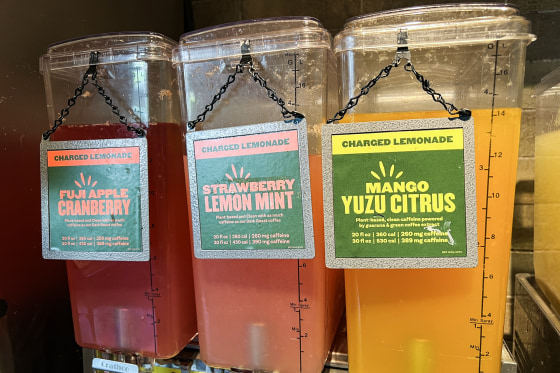A New Jersey congressman wants to pass legislation that would increase transparency around caffeine content, three years after the death of a student with a heart condition who consumed a highly caffeinated lemonade.
Named in honor of the 21-year-old student, the Sarah Katz Caffeine Safety Act would require restaurant chains to disclose on menus and drive-thru kiosks whether a food or drink contains 150 milligrams or more of caffeine, which is about as much as is in a 16-ounce caffe latte or three cans of Diet Coke.
The bill from Rep. Rob Menendez, D-N.J., would also require energy drink companies to label the amount of caffeine and other stimulants in their beverages.
“It’s simple. We want every consumer to know what they’re drinking,” he said at a news conference Monday. “These changes will ensure that everyone, no matter how old or young, can walk into a store or order off a menu and know with confidence how much caffeine is in their drink.”
The bipartisan legislation would also direct federal agencies to increase public education about the effects of caffeine and to study the way that energy drinks are marketed to young people.
Menendez introduced the bill at the end of last year. He reintroduced it this week in Katz’s hometown of Jersey City, flanked by her parents and other parents who lost their children to sudden cardiac arrest.
“I think Sarah would be really proud,” her mother, Jill Katz, told NBC News on Wednesday. “She can’t help people anymore, but we can.”

Katz had been diagnosed at a young age with a genetic heart condition called Long QT syndrome, which the American Heart Association describes as a disorder of the heart’s electrical system that can cause abnormal heart rhythms. It can be well-managed with medication and lifestyle changes, and Katz avoided energy drinks at her doctors’ recommendation.
In September 2022, Katz bought a Charged Lemonade from a Panera Bread restaurant in Philadelphia and later went into cardiac arrest, according to a 2023 wrongful death lawsuit filed by her family that ended in a settlement with Panera last fall. A friend told NBC News that Katz would not have consumed the lemonade had she known what was in it: A large cup of the Charged Lemonade contained 390 milligrams of caffeine when served without ice, which is nearly the total daily maximum amount of 400 milligrams that the Food and Drug Administration recommends for healthy adults.
The drink also contained guarana, another stimulant commonly found in energy drinks. The Charged Lemonade was dispensed to customers side-by-side with non-caffeinated beverages at self-serve stations, the lawsuit said, which called it a “dangerous energy drink” that Panera should have known could cause “catastrophic injuries and/or death.”
Panera has denied wrongdoing in court documents. It instituted a number of changes following the lawsuit, including moving the Charged Lemonade behind the counter and updating its nutrition information to reflect how much caffeine was in the drink when it was served with ice. It also added prominent signs cautioning that Charged Lemonade contained caffeine, should be consumed in moderation and was not recommended for children, people sensitive to caffeine, pregnant or nursing women.
In May, the bakery-cafe chain announced it was discontinuing the beverage as part of a “recent menu transformation.”
The lawsuit was the first of at least four that Panera ended up facing over its Charged Lemonade. A second lawsuit blamed it for a Florida man’s death, while the other two alleged that the drink caused permanent heart injuries in previously healthy people. Those three lawsuits are ongoing.
Panera has stood by the safety of its products. Following the second death, it said in a statement that it felt the customer’s “unfortunate passing was not caused by one of the company’s products.”
Menendez’s bill is endorsed by the American Academy of Pediatrics, heart health organizations and consumer advocacy groups.
“Caffeine’s reinforcing properties create powerful incentives for companies to use it in their products, at levels higher than many consumers would prefer, including for products marketed to children,” Thomas Gremillion, director of food policy at the Consumer Federation of America, said in a statement. “The Sarah Katz Caffeine Safety Act provides a check on these perverse incentives, and allows consumers to decide how much, if any, caffeine is right for them.”
The American Beverage Association, a trade group, told NBC News that nearly all energy drink manufacturers already voluntarily abide by the association’s guidelines for labeling, which includes declaring the total amount of caffeine from all sources on cans. (Ingredients such as guarana are listed in the beverage’s nutrition panel.)
“For more than a decade, America’s leading energy drink manufacturers have gone beyond all federal requirements when it comes to responsible labeling and marketing practices by displaying total caffeine content from all sources on labels and adhering to a long-standing commitment to not market to children,” the association said in an emailed statement.

